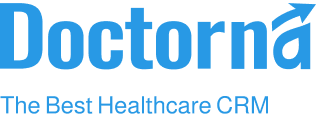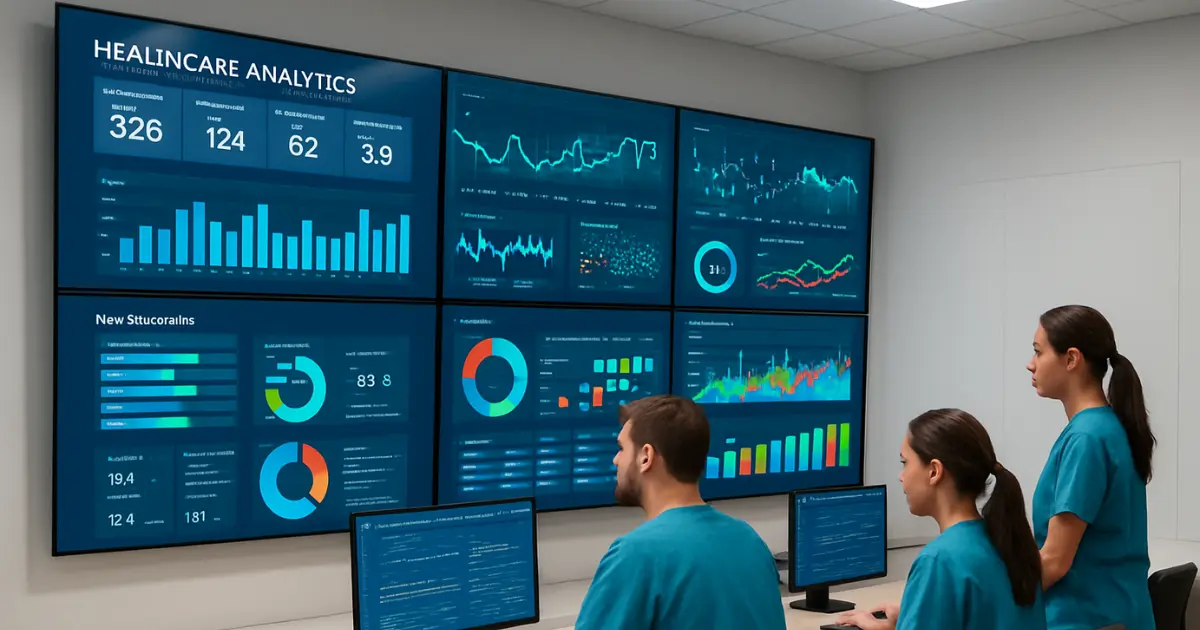Understanding Healthcare CRM Solution & Its Need
Let’s begin by understanding the foundational shift happening in healthcare today. The modern healthcare landscape is undergoing a fundamental shift. For years, the focus was on the patient’s immediate visit—the appointment itself. Today, a new standard has emerged: building lasting, patient-centric relationships that extend far beyond a single consultation. Many practices, however, struggle to manage these relationships effectively, leading to missed opportunities for follow-up, low patient retention, and fragmented communication.
The statistics highlight the urgency of this shift. The global healthcare CRM market is projected to grow from an estimated $18.76 billion in 2025 to over $43 billion by 2034, with a significant portion of this growth being driven by the need to improve patient engagement. Research has shown that clinics using CRM-based appointment reminders saw a 25% reduction in no-shows, while a separate study found that organizations with integrated CRM and EMR systems achieved a 15% higher patient retention rate.
This is where a dedicated healthcare CRM solution comes in. It’s not just a database; it’s a strategic tool designed to manage, track, and optimize every patient interaction from the very first inquiry to post-treatment follow-up. This guide will walk you through the essential features and immense benefits of a full-featured healthcare CRM solution, and provide a practical, step-by-step process for choosing the right one for your practice.
What Exactly is a Healthcare CRM Solution?
Before we dive into the benefits, it’s crucial to define what a healthcare CRM solution truly is. At its core, a healthcare CRM solution is a specialized Customer Relationship Management system built specifically for the unique needs of the healthcare industry. Its primary goal is to centralize all patient data, automate communication, and systematically improve the overall patient experience.
A key differentiator to understand is that a healthcare CRM is distinct from an Electronic Medical Record (EMR) or a Patient Management System (PMS). While these systems are often confused, they serve different, albeit complementary, purposes:
- EMR: This system focuses on clinical data, such as diagnoses, treatment plans, and medical history.
- PMS: This system is primarily for administrative tasks, like scheduling, billing, and insurance claims.
- CRM: A healthcare CRM solution focuses squarely on the “relationship” and engagement aspects. It’s the engine for communication, marketing, and fostering patient loyalty.
For a robust solution, these systems should be integrated, working together to provide a complete, 360-degree view of the patient’s journey, from their administrative needs to their clinical history and all communication in between. Ultimately, a CRM provides the connective tissue that links a patient’s administrative and clinical journey.
Why Invest in a Full-Featured Healthcare CRM?

Exploring the reasons to invest reveals a host of strategic advantages for your practice. Implementing a comprehensive healthcare CRM solution isn’t just about adding a new piece of software; it’s about making a strategic investment that can transform your practice.
- Supercharge Patient Acquisition: A CRM can automate lead capture from various sources like your website or social media. It can then streamline the new patient onboarding process and nurture potential patients with targeted, relevant information, converting leads into loyal patients.
- Drive Patient Retention and Loyalty: The cost of acquiring a new patient is often far greater than retaining an existing one. A CRM automates proactive reminders for follow-up appointments and preventive care, enables personalized and secure communication to build trust, and helps you manage patient feedback to continuously improve the quality of care.
- Streamline Communication and Workflow: A CRM centralizes all patient communication—email, SMS, and secure messaging—in one place. This allows you to automate routine tasks like appointment reminders, post-visit follow-ups, and pre-appointment forms, which in turn improves internal collaboration and ensures no patient falls through the cracks.
- Boost Practice Growth and Revenue: By enabling targeted marketing campaigns based on patient demographics or health history, a CRM helps you reach the right patients with the right message. This improves operational efficiency by reducing administrative burdens and ultimately increases patient lifetime value, contributing to a healthier bottom line.
In essence, a CRM is a powerful tool for building a more resilient, efficient, and profitable practice.
Essential Features of a Full-Featured Healthcare CRM Solution
When you’re ready to evaluate options, knowing the key features of a truly full-featured solution is critical. When evaluating a healthcare CRM solution, these are the critical functionalities that will differentiate a powerful tool from a basic one.
- Patient Communication & Engagement Suite: Look for a system that supports multi-channel messaging (secure portals, SMS, email), automated reminders for appointments, and a user-friendly patient portal for self-service tasks like booking appointments or completing forms.
- Marketing & Outreach Automation: A powerful CRM will include tools for creating and tracking marketing campaigns, the ability to segment patients for highly targeted outreach, and integrated reputation management tools to gather patient reviews and maintain a positive online presence.
- Seamless Integration and Data Management: Integration is non-negotiable. The CRM must connect with your existing EMR/EHR to provide a unified patient view. It should also have real-time synchronization with your scheduling software and offer robust analytics and reporting to track key performance indicators.
- Unwavering Security and Compliance: Patient data is sensitive, so security is paramount. The solution must be built to meet strict data privacy regulations like HIPAA and GDPR. Essential features include data encryption, role-based access control, and comprehensive audit trails to protect both your patients and your practice.
By prioritizing these features, you can ensure the healthcare CRM solution you choose is equipped to handle the demands of modern practice.
Your Step-by-Step Guide to Choosing the Right Solution

Choosing the right solution can seem daunting, so here is a practical, step-by-step guide to simplify the process.
- Step 1: Define Your Needs. Start by identifying your biggest pain points. Are you struggling with low patient retention? Poor online reviews? An inefficient new patient intake process? Clearly defining your challenges will help you find a solution that addresses them directly.
- Step 2: Evaluate Core Features. Create a checklist of your “must-have” features based on the essential functionalities discussed above. Do not compromise on security, integration capabilities, and communication tools.
- Step 3: Consider Scalability and Support. Choose a solution that can grow with you. Inquire about implementation support, staff training, and the availability of ongoing customer service to ensure a smooth transition and long-term success.
- Step 4: Request Demos and Inquire About Pricing. See the software in action with a live demo. Ask to see how it integrates with your existing EMR/PMS. Be sure to understand the full cost, including any one-time implementation fees and recurring subscription costs.
- Step 5: Review Security Credentials. Your vendor should be able to provide documentation proving the software’s compliance with HIPAA, GDPR, and other relevant regulations. This is a crucial step to protect your practice and your patients’ data.
Following these steps ensures you make an informed decision that aligns with your practice’s long-term goals.
Conclusion
To wrap up, let’s reiterate the central theme of this guide. Investing in a full-featured healthcare CRM solution is a strategic decision that empowers your practice to move beyond transactional care. It’s about building meaningful, lasting relationships with your patients, which in turn leads to improved loyalty, better health outcomes, and sustainable business growth. By carefully evaluating a solution’s features, integration capabilities, and commitment to security, you can select a partner that helps you thrive in the modern healthcare environment.
Doctorna offers a comprehensive healthcare CRM solution designed to seamlessly integrate with your existing systems and provide all the tools you need to build stronger patient relationships.
Frequently Asked Questions (FAQs)
To address some common queries, here are answers to the questions we frequently hear about healthcare CRM solutions.
Q. What is the ROI of a healthcare CRM?
A: The Return on Investment (ROI) is seen through increased patient retention, a larger patient base from effective marketing, reduced administrative costs from automation, and improved patient satisfaction scores.
Q: Is a healthcare CRM the same as a patient portal?
A: No, a patient portal is a feature of a comprehensive healthcare CRM solution, which includes a wider range of tools for marketing, communication, and analytics.
Q: How is a CRM different from a practice management system?
A: A PMS is focused on internal operations like scheduling and billing. A healthcare CRM is focused on external patient relationships and communication, working hand-in-hand with a PMS to provide a full-spectrum solution.
Q: Can a healthcare CRM improve patient outcomes?
A: Yes, by automating crucial communication like medication reminders and follow-up care, a CRM helps improve patient adherence to treatment plans, which can lead to better health outcomes.







